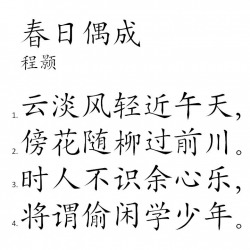dailycharacter
春日偶成(程颢)
Title: Impromptu Lines on a Spring Day ▪ 春日偶成
Author: Cheng Hao ▪ 程颢
Poetic Form: júejù ▪ 绝句
Apologies, individual character links no longer available for this poem...
1. (云 + 淡) + (风 + 轻) + (近 + (午 + 天))
(cloud + light in color) + (wind + light/easy) +
(near + (midday + sky/day))
gloss: Toward noon, light-colored clouds [are in
the sky] and the breeze is light
2. (傍 + 花) + (随 + 柳) + (过 + 前 + 川)
(to draw near + flowers) + (to accompany +
willows) + (cross + forward + river)
gloss: Amid flowers and willows I cross the river
3. ((时 + 人) + (不 + 识)) + (余 + (心 + 乐))
((time + people) + (not + to know)) + (I + (heart +
joy))
gloss: My contemporaries do not know/are not
aware of the joy that is in my heart
4. 将 + 谓 + (偷 + 闲) + (学 + (少 + 年))
[future] + to say + (to steal + idleness) + (to
imitate + (few/young + years))
gloss: [They] will say that I steal leisure time like
a youth
Author: Cheng Hao ▪ 程颢
Poetic Form: júejù ▪ 绝句
Apologies, individual character links no longer available for this poem...
1. (云 + 淡) + (风 + 轻) + (近 + (午 + 天))
(cloud + light in color) + (wind + light/easy) +
(near + (midday + sky/day))
gloss: Toward noon, light-colored clouds [are in
the sky] and the breeze is light
2. (傍 + 花) + (随 + 柳) + (过 + 前 + 川)
(to draw near + flowers) + (to accompany +
willows) + (cross + forward + river)
gloss: Amid flowers and willows I cross the river
3. ((时 + 人) + (不 + 识)) + (余 + (心 + 乐))
((time + people) + (not + to know)) + (I + (heart +
joy))
gloss: My contemporaries do not know/are not
aware of the joy that is in my heart
4. 将 + 谓 + (偷 + 闲) + (学 + (少 + 年))
[future] + to say + (to steal + idleness) + (to
imitate + (few/young + years))
gloss: [They] will say that I steal leisure time like
a youth
Translation
Impromptu Lines on a Spring Day
translation by Jessica Alexander ©
Nearly noon, faint clouds drift in a soft breeze;
I cross over the river amidst flowers and willows.
Men of my time know not my inner joy:
They will say I am like a youngster, thieving away
idle hours.
translation by Jessica Alexander ©
Nearly noon, faint clouds drift in a soft breeze;
I cross over the river amidst flowers and willows.
Men of my time know not my inner joy:
They will say I am like a youngster, thieving away
idle hours.
Analysis
As suggested by its title, this poem describes a lazy spring day in which Cheng Hao goes for a walk. The first half of the poem uses five main nouns to describe the scene: clouds (云), wind (风), sky (天), flowers (花), willow trees (柳), and river (川). This is all the description the poet gives us of his walk, a description built in lines 1 and 2 with careful balance and numerous directional terms (近,傍,随, and前). In line 3, Cheng Hao introduces an abrupt contrast to the quiet nature he has thus far portrayed, mentioning both himself (余) and others (时人, his contemporaries). This line tells the reader what Cheng Hao’s coevals do not know (that is, the contentment in the poet’s own heart), while the poem’s final line describes what said contemporaries will say about him. The reader is led to understand that what will be said about the poet is not true. But ending the poem with an “un-statement”, the poet opens the reader’s imagination to all that may be true about the walk he is taking.
Other Translations
Unable to find any current translations. Please contact me if you know of one!

